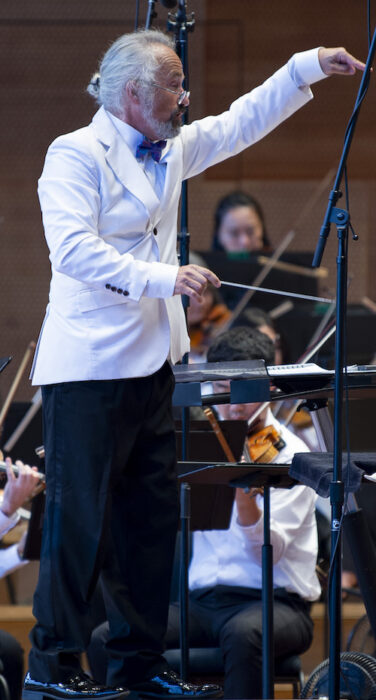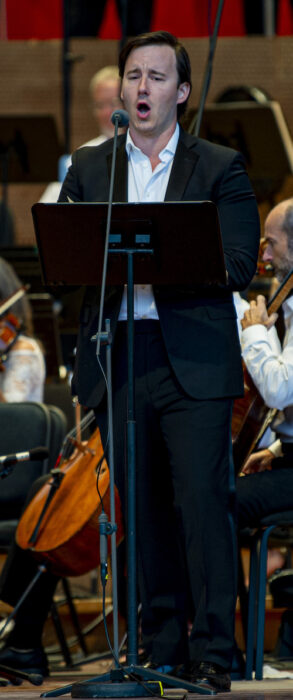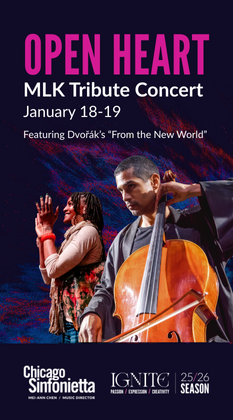Kalmar, Grant Park Orchestra wrap season with a delightfully devilish finale

The Grant Park Music Festival usually closes its summer season with a large choral work. The historic trajectory of Western music dictates that invariably means music with a religious text and specific Christian inspiration—be it from overtly religious composers (Haydn, Mozart, Beethoven), skeptics (Brahms) and in between (Mahler).
The final program of the 2023 lakefront festival, heard Friday night at the Pritzker Pavilion and to be repeated on Saturday, is taking a consciously different tack. This year Carlos Kalmar has come up with some refreshingly subversive counterprogramming that would rather laugh with the sinners than cry with the saints.
The through-line was devilry and paganism, a motif that was especially manifest in the first half. One concertgoer in the first row clearly recognized the evening’s theme, dressing in a witch costume complete with high Margaret Hamilton-esque hat (too bad for those sitting behind her).
What better music to lead off such a program than Mussorgsky’s Night on Bald Mountain, which depicts a witches’ sabbath? Kalmar led an uncommonly fresh and exciting reading of this familiar music, with fiery, full-bodied playing of the Dionysian revels from the Grant Park musicians. The performance really scored in the closing section with the church-bell chimes ideally placed and the dawn music that disperses the underworld spirits drawn out spaciously, enhanced by the eloquent playing of principal clarinet Dario Brignoli.
Felix Mendelssohn’s Die erste Walpurgisnacht (The First Walpurgis Night) is performed with some regularity in German-speaking countries but remains virtually unknown this side of the Atlantic. The forbidding title likely has something to do with that as well as the practical challenges of programming an obscure 34-minute piece that calls for large chorus and four soloists.
Mendelssohn was a devout converted Lutheran but clearly enjoyed setting this Goethe poem about the Druids’ pagan spring rituals being opposed by the Christians. “Interestingly enough, the Christians are kind of the bad guys,” said Kalmar in his introduction with undisguised relish.
Kalmar is often at his best when making a case for repertoire rarities that deserve to be better known, and such was the case again on a beautiful Friday evening on Chicago’s lakefront. Mendelssohn’s style is immediately manifest in the opening bars of the vital Overture, which benefited from superb horn work by principal Jonathan Boen.
While Goethe’s ballade poem lacks a firm dramatic narrative, the music is top-drawer Mendelssohn throughout. The composer’s polished craft, rhythmic verve and masterful choral writing make the nine brief connected sections fly by. Kalmar proved an alert guide throughout, keeping strong momentum and giving each element of this offbeat work room to register.
Clad in a gold patterned jacket that aptly suggested a Druid master of ceremonies by way of Las Vegas, Miles Mykkanen made quick impact with his vibrant high tenor leading the Druids’ choral praise to nature.

The baritone has the largest role here and Alex DeSocio proved a terrific soloist, singing with a powerful voice as the Druid Priest and investing his arias with expressive poise and patriarchal gravitas.
The other two soloists get just a single opportunity apiece and were taken by chorus members. Corinne Wallace-Crane displayed a dusky contralto though her capable singing was mitigated by a persistent wobble. The reliable bass-baritone David Govertsen contributed his usual vocal strength as the Watcher of the Druids.
The performance was sealed by magnificent singing from the Grant Park Chorus in one of their finest stands of recent seasons. Prepared by Lyric Opera’s Michael Black, the ensemble delivered heaven-storming—or hell-storming—singing of nearly unhinged intensity as the victorious Druids scare off the encroaching Christians (“Come with prong and come with fork”). In the majestic finale—the chorus rose to a coda of overwhelming brilliance and sonic impact (”Whoe’er can crush Thy light?”).
Amplification was ideally judged in the Mendelssohn and throughout the program. The orchestra, chorus and soloists all enjoyed a strong, well-balanced presence yet also fine clarity without any blaring. The settings used Friday night should be saved for next year—rather than starting from square one, which often seems to be the case.
The festival noted this 150th birthday year of Sergei Rachmaninoff by closing with his Symphonic Dances. The composer’s final work, completed in 1940, is a symphony in all but name, his trademark lyricism still present yet in a tauter, less sumptuous style. The evening’s pagan theme is less immediately apparent in this work, though the Dies Irae permeates the final movement, which closes in a manner more grimly driven than victorious.
At the top of his game all evening, Kalmar led an incisive and idiomatic performance of Rachmaninoff’s swan-song. The stern restlessness of the opening movement’s main theme contrasted pointedly with the lean lyricism of the secondary theme, the latter nicely enhanced by Julian Velasco’s sinuous saxophone. The conductor and musicians conveyed the eerie, unsettling qualities of the Andante’s spectral waltz.
The mercurial finale is a challenge to pull off, but Kalmar kept consistent momentum through the varied episodes and built the tension to a blazing if hardly affirmative coda. The Grant Park Orchestra members contributed first-class playing across all sections.
Who will bring us these kind of thoughtful programs and such wonderful neglected repertoire as the Mendelssohn work after Carlos Kalmar departs in 2025? Let us hope the Grant Park board and administration choose wisely.
The program will be repeated 7:30 p.m. Saturday. gpmf.org
Posted in Uncategorized

Posted Aug 20, 2023 at 12:59 pm by Claude M. Weil
I wonder what purpose Mendelssohn had in writing this music with its particularly strong choral sections. I think the soloists had a somewhat hard time keeping up with it. Without specifically mentioning Judaism, did he want to give validity to other faiths than Christianity?
C. Weil
Posted Aug 20, 2023 at 1:52 pm by Lawrence A. Johnson
I believe you may be correct.
While he composed much choral music, Mendelssohn wrote no masses and of his two oratorios, one is New Testament (“St. Paul”) and the other Old Testament (“Elijah”).
And, as noted in the review, in “Die ertse Walpurgisnacht,” he was down with the Druids.
Posted Aug 20, 2023 at 3:03 pm by Fsm
I unfortunately can’t be there to enjoy what sounds like a wonderful concert but just want to echo that yes, the sound engineers should save the sound settings when they finally get them right. What a novel idea; hope they’re listening to you!
Secondly, a lot of praise should go to Maestro Kalmar and the musicians for bringing top notch programming and performances on beautiful summer nights for all these years. Wish I could be there tonight but I’ll look up the Mendelssohn because of this review.
Posted Aug 22, 2023 at 3:28 am by Robert Scharba
I believe weather conditions…especially humidity…can significantly affect sound quality in an outdoor setting. It’s not completely controllable from day to day.